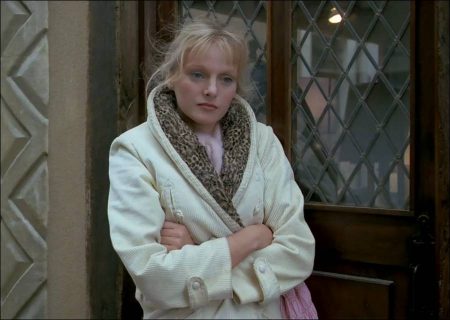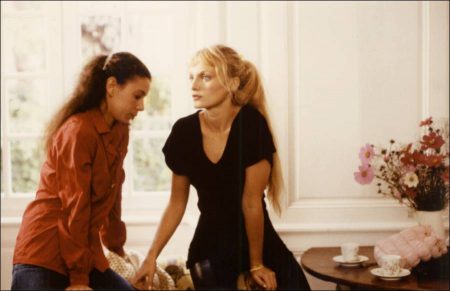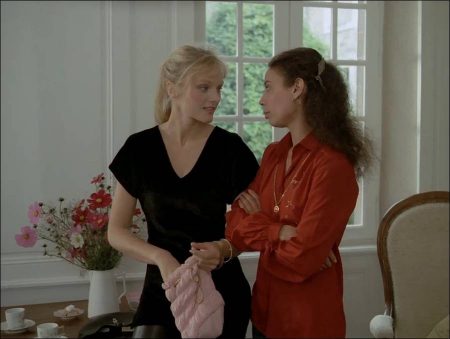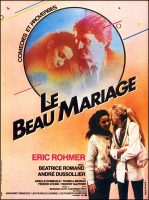Le Beau Marriage movie storyline. Sabine (Béatrice Romand) goes from Le Mans to Paris, where she studies art history and has a lover, Simon (Féodor Atkine), a painter. They make love in his studio, but are interrupted by a phone call from his son. She gets annoyed and breaks the liaison. Back in Le Mans she explains to her friend Clarisse (Arielle Dombasle) that she is tired of married men with kids. She also declares that she is going to be married herself.
When Clarisse asks her who the man is, Sabine says that she doesn’t know yet. Finding a man is not the problem, but to get a good marriage. Clarisse argues that it must start with love, but Sabine thinks that there’s some will even in love. At a party Sabine is introduced by Clarisse to her cousin Edmond (André Dussollier), a Parisian lawyer. Afterwards Clarisse claims that she saw a glow in both Edmond’s and Sabine’s eyes. She is sure it was love at first sight. Sabine protests, but Clarisse advises her to approach Edmond.
Sabine phones him and invites him to Le Mans. He is very busy, but comes after some hesitation. They meet twice and Sabine interprets his attitude as being in love with her. She explains to everyone that she is going to marry Edmond. But nothing happens. He doesn’t contact her. She phones several times to his office, and leaves messages through his secretary, but he never phones back. Finally she goes in despair to his office. He explains to her that he doesn’t love her.

Film Review for Le Beau Marriage
LIKE the major characters in most of Eric Rohmer’s comedies, Sabine (Beatrice Romand), the heroine of Mr. Rohmer’s new ”Le Beau Mariage,” seems almost ordinary at first. She is pretty in a fresh but unspectacular way, articulate and seemingly well adjusted to a kind of enlightened middle-class existence.
Part of the week Sabine works in an antique shop in Le Mans, where she lives with her younger sister and widowed mother, and the rest of the week she is in Paris, where she is studying – half-heartedly – for a degree in art history and carrying on a casual affair with a married painter named Simon.
One night as she and Simon are making love in his apartment, the telephone rings. The call is from his children, who are reporting, probably at their mother’s suggestion, on some recent accomplishment, which the father attends to with patient pleasure. Sabine gets out of bed, dresses quickly and, when she finally has Simon’s attention, announces that she is leaving, not for the night but for good.
By way of explanation she tells him she is getting married. To whom? Sabine says she doesn’t know. She hasn’t yet met the man, but she has no doubt that she soon will. Sabine is fed up with a life of freedom and understanding.
This is more or less the jumping-off place for ”Le Beau Mariage” (translated into English as ”The Well-Made Marriage”), one of Mr. Rohmer’s most charming and, in some ways, most compact comedies. The film reduces the relations between the sexes in 20th-century Western civilization to the dimensions of Sabine’s single-minded pursuit of Mr. Right in Le Mans and Paris and back again. Sabine might at first appear to be ordinary, but it soon becomes apparent that her ordinariness disguises a woman of quite extraordinary emotional tenacity and moral conviction.
Sabine is alternately sweet and ferocious as she puts into effect her plan to convince Edmond (Andre Dussollier), a handsome, thirtyish Parisian lawyer that the two of them are made for each other, or at least as made for each other as any two people ever are – Sabine is a pragmatist. Edmond is at first amused and then alarmed.
One of the consistent rewards of Mr. Rohmer’s films (”My Night at Maud’s,” ”Claire’s Knee,” ”Perceval,” among others) is that his characters never behave in ways made predictable by the second-rate fiction of others. Under any other circumstances Sabine would probably be intolerable in the way she dogs the trail of poor Edmond and refuses to take his lack of telephone calls as a sign of indifference, which, of course, it is.
Sabine is neither stupid nor arrogant. She is, rather, totally convinced of the utter reasonableness of what she’s about. It’s this reason, sometimes misapplied, that forever separates her – and other Rohmer characters – from the people who turn up in far more conventional romantic comedies.
Mr. Rohmer is one of the few film makers who can create convincingly intelligent characters, people whose thought processes are in some fashion demonstrated and not solely defined by the music they listen to or the books they say they have read. Unlike ”My Night at Maud’s” and ”Claire’s Knee,” there is little such namedropping going on here. Sabine is certainly not an intellectual, but she is a remarkably self-aware, engaging woman with a no-nonsense approach to her life.
Le Beau Marriage (1982)
Directed by: Éric Rohmer
Starring: Béatrice Romand, André Dussollier, Féodor Atkine, Arielle Dombasle, Huguette Faget, Thamila Mezbah, Sophie Renoir, Hervé Duhamel, Virginie Thévenet, Denise Bailly, Anne Mercier
Screenplay by: Éric Rohmer
Cinematography by: Bernard Lutic
Film Editing by: Cécile Decugis
Art Department: Alberto Bali
Music by: Ronan Girre, Simon des Innocents
MPAA Rating: None.
Distributed by: Acteurs Auteurs Associés
Release Date: May 19, 1982
Views: 177


